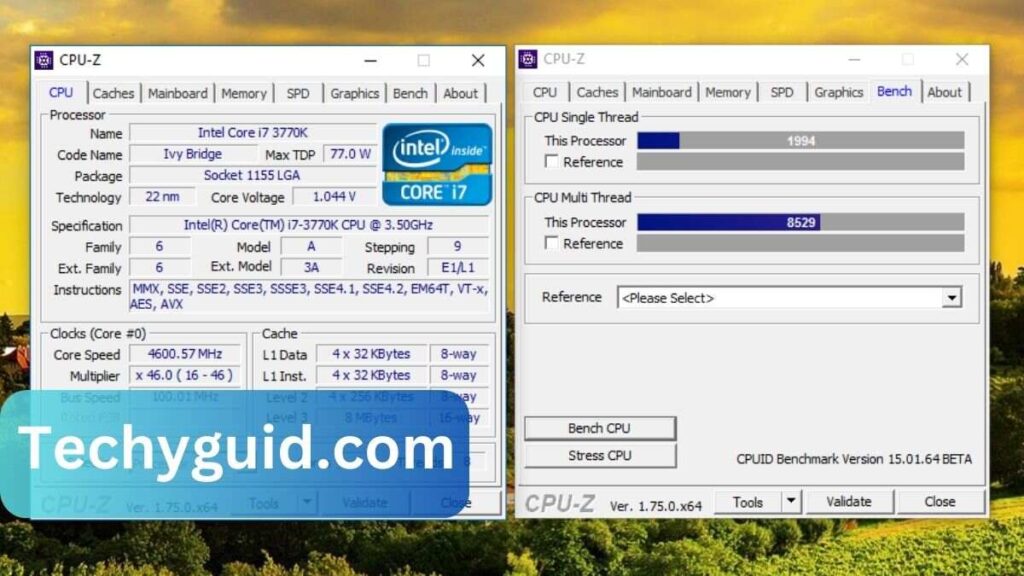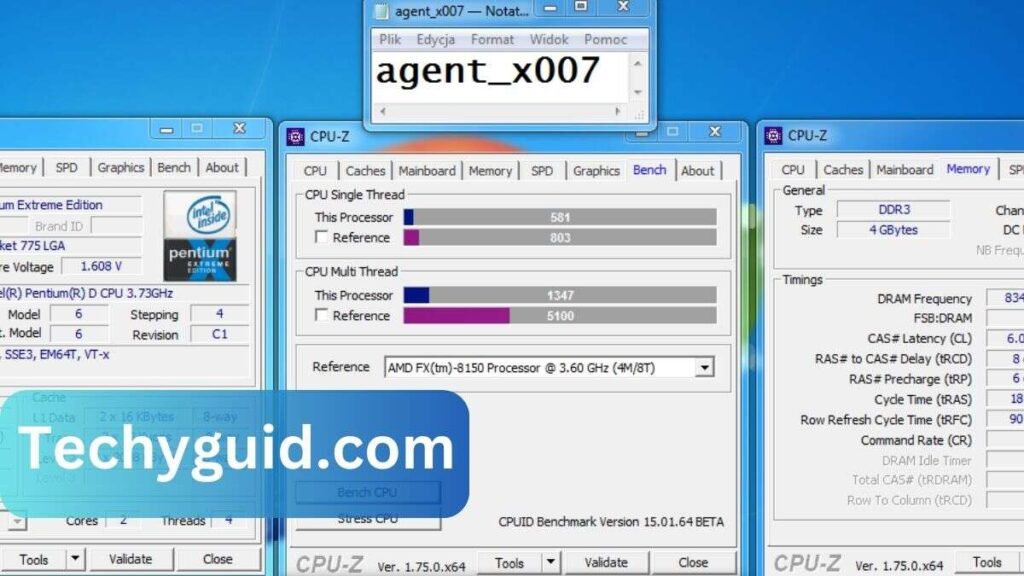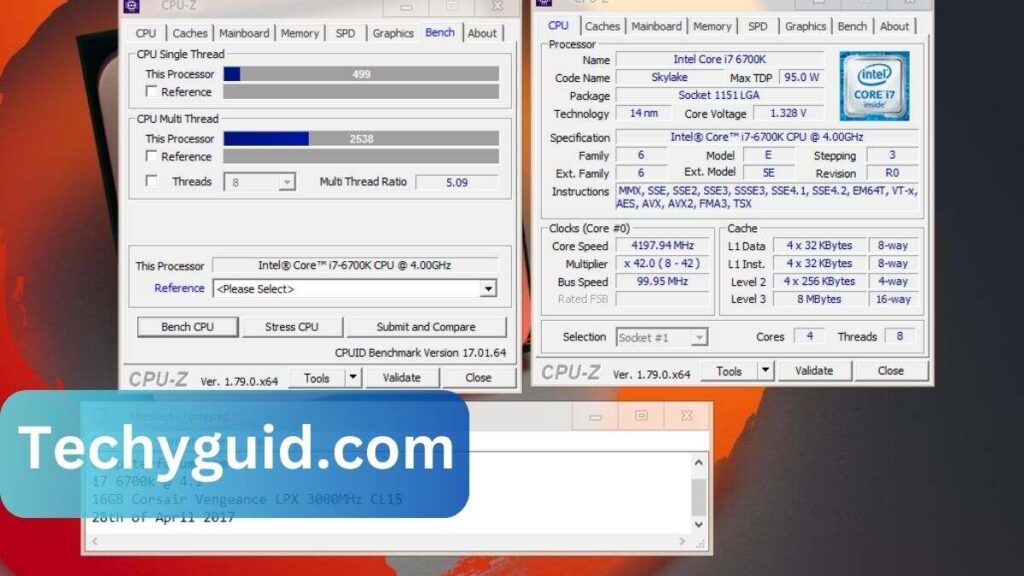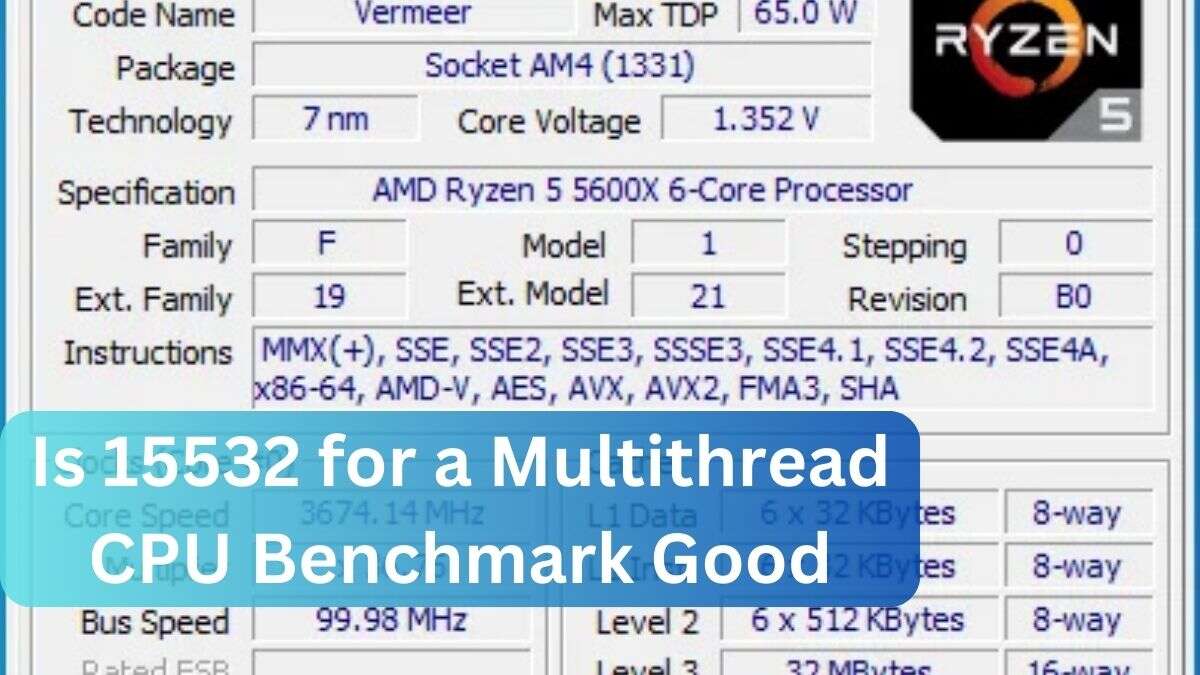A multithread CPU benchmark score of 15532 is considered good for a mid-range CPU. It offers solid performance for gaming, video editing, and multitasking but may not be ideal for high-end workloads like 4K rendering. If your system runs smoothly for your needs, there’s no urgent need for an upgrade.
When I tested my CPU and got 15532 for a multithread CPU benchmark, I found it handled gaming and video editing smoothly without major slowdowns. However, for heavy 4K rendering, I noticed a more powerful CPU would perform better.
In this article we discuss about “Is 15532 for a Multithread CPU Benchmark Good”.
Table of Contents
Introduction
If you’ve run a multithread CPU benchmark and received a score of 15532, you might be wondering whether it’s a good score. The answer depends on various factors such as the type of CPU, its intended use, and how it compares to other processors. Let’s dive deep into what this benchmark score means and how it stacks up in the world of CPUs.
What is a Multithread CPU Benchmark?

A multithread CPU benchmark evaluates a processor’s performance across multiple cores and threads. These tests measure how efficiently a CPU can handle simultaneous tasks, which is crucial for workloads like gaming, video editing, programming, and multitasking.
Why Multithread Performance Matters
- Better multitasking – More threads mean smoother performance while running multiple applications.
- Enhanced productivity – Useful for professionals working with 3D rendering, video editing, and software development.
- Improved gaming experience – Some modern games leverage multithreading for better FPS and responsiveness.
Breaking Down the Score of 15532
1. Understanding Benchmark Scores
Benchmark scores vary depending on the testing tool used, but a score of 15532 generally falls within the mid-to-high range. To assess whether it’s good, consider these factors:
- Low-end CPUs – Typically score below 10,000
- Mid-range CPUs – Score between 10,000 and 20,000
- High-end CPUs – Score above 20,000
2. Comparing with Popular CPUs
Here’s how a 15532 multithread benchmark score compares with some well-known CPUs:
| CPU Model | Average Multithread Score | Category |
| Intel Core i5-12600K | ~17,000 | Mid-to-High |
| AMD Ryzen 5 5600X | ~15,500 | Mid-Range |
| Intel Core i7-12700K | ~22,000 | High-End |
| AMD Ryzen 7 5800X | ~21,000 | High-End |
From this, we can see that 15532 is a respectable score, placing it within the mid-range CPU performance category.
Read Most Important: CPU Cooler with a Cat on It – A Fun and Functional Cooling Solution 2025!
3. Performance in Real-World Scenarios
- Gaming: A score of 15532 is decent for gaming, handling most AAA titles at 1080p and 1440p smoothly. However, for 4K gaming, you might need a more powerful CPU.
- Video Editing: This score should be good for 1080p and light 4K video editing, but professionals might prefer a higher-end CPU.
- Software Development: Ideal for compiling code efficiently, but may struggle with extremely large projects.
Factors That Influence Benchmark Scores
1. CPU Architecture
Newer architectures perform better even at similar clock speeds. For instance, Intel’s Alder Lake and AMD’s Ryzen 5000 series outperform older models.
2. Number of Cores and Threads
A 6-core/12-thread CPU will generally score lower than an 8-core/16-thread CPU due to increased multitasking efficiency.
3. Clock Speed and Boost Frequency
A higher clock speed improves single-threaded tasks, while boost frequencies help maintain better performance under heavy workloads.
4. Cooling and Power Limits
CPUs with better cooling solutions and higher power limits tend to sustain higher performance, leading to better benchmark results.
How to Improve Your CPU’s Benchmark Score
1. Optimize Cooling
Using a better CPU cooler and applying quality thermal paste can help maintain peak performance.
2. Enable XMP for RAM
Faster RAM speeds improve CPU performance, so enabling XMP (Extreme Memory Profile) can give your CPU a slight boost.

3. Overclocking
If your CPU supports overclocking, increasing its clock speed can lead to a better score, provided you have adequate cooling.
4. Close Background Applications
Running unnecessary applications in the background can slow down your CPU during benchmarking. Close any non-essential programs.
Should You Upgrade Your CPU?
If your current CPU meets your needs, there’s no urgent need for an upgrade. However, if you’re experiencing slow performance in gaming, rendering, or multitasking, moving to a higher-tier CPU could be beneficial.
What Is A CPU Benchmark?
A CPU benchmark is a standardized test used to measure a processor’s performance. It evaluates how well a CPU handles different tasks, such as single-threaded operations, multi-threaded workloads, and floating-point calculations. These tests help users compare different CPUs and determine their efficiency in various applications like gaming, content creation, and data processing.
Importance of CPU Benchmarks
CPU benchmarks are crucial because they:
- Help in selecting the right processor for gaming, productivity, or professional workloads.
- Provide an objective performance comparison between different CPU models.
- Assist in troubleshooting and system optimization by identifying potential performance bottlenecks.
- Aid overclockers in measuring performance gains after CPU tuning.
Read Most Important: CPU 15470K – A Comprehensive Guide 2025!
Without benchmarks, it would be difficult to gauge how one CPU compares to another in real-world performance.
Different Types of CPU Benchmarks
There are several types of benchmarks used to test CPUs:
- Single-Threaded Benchmarks – Measure how well a CPU handles tasks using a single core. Essential for applications like web browsing and old games.
- Multi-Threaded Benchmarks – Assess how efficiently a CPU utilizes multiple cores and threads. Important for video editing, rendering, and heavy multitasking.
- Synthetic Benchmarks – Programs like Cinebench, Geekbench, and PassMark simulate workloads to produce performance scores.
- Real-World Benchmarks – Test CPUs using actual applications like Adobe Premiere Pro, Blender, or gaming FPS tests to determine practical performance.
Each benchmark type provides valuable insights into different aspects of a CPU’s performance.
Understanding the Significance of Benchmark Scores
Benchmark scores indicate how fast a CPU performs under different workloads. A higher score typically means better performance, but it should be compared within the same category of processors.
For example, a gaming CPU may score lower in multi-threaded tests but still provide excellent FPS in games. Meanwhile, a workstation CPU with high multi-thread scores may be great for video rendering but overkill for gaming.
How Benchmark Scores Reflect CPU Performance
Benchmark scores directly correlate with real-world CPU performance in various tasks:
- Higher single-thread scores mean better gaming and application responsiveness.
- Higher multi-thread scores improve performance in rendering, encoding, and data analysis.
- A balance of both ensures all-around efficiency.
A benchmark score alone doesn’t tell the full story, but it provides a useful reference when comparing CPUs.
The Role of Multi-thread Performance in Real-World Applications
Multi-thread performance determines how efficiently a CPU can handle workloads that require multiple cores. It is critical for:
- Video editing and rendering (Adobe Premiere Pro, DaVinci Resolve)
- 3D modeling and animation (Blender, AutoCAD)
- Software development and compilation (Visual Studio, Android Studio)
- Scientific computing and simulations
Multi-threading allows faster task completion, especially in professional applications.
Evaluating the Benchmark Score of 15532
A multithread CPU benchmark score of 15532 places it in the mid-range category. It’s powerful enough for gaming, content creation, and general multitasking but may not be sufficient for extreme workloads like 8K video editing or large-scale simulations.
To determine if 15532 is good for your needs, compare it to CPUs in similar and higher performance tiers.
Is 15532 a Good Score for a Multithreaded CPU Benchmark?
Yes, a benchmark score of 15532 is considered good for a mid-range CPU. It provides:
✅ Smooth gaming performance at 1080p and 1440p.
✅ Decent video editing capabilities for 1080p and some 4K projects.
✅ Good performance for programming and multitasking.
However, if you require high-end performance, a CPU with a higher multithread score (above 20,000) would be better.
Factors That Affect Benchmark Scores
Several factors influence CPU benchmark scores:

- Core Count & Thread Count – More cores and threads improve multi-thread performance.
- Clock Speed & Turbo Boost – Higher clock speeds enhance single-threaded tasks.
- Architecture & Manufacturing Process – Newer architectures (like Intel Alder Lake or AMD Ryzen 7000) offer better efficiency.
- Cooling & Power Limits – A well-cooled CPU maintains high performance during benchmarks.
- Memory Speed & Latency – Faster RAM can improve CPU scores.
Optimizing these factors can help boost your benchmark results.
Performance Considerations for Multi-threaded Tasks
Multi-threaded performance is essential for tasks that require heavy CPU usage, such as:
- Rendering 3D models in Blender.
- Encoding high-resolution videos in Handbrake.
- Running virtual machines for software development.
- Processing large datasets in AI or machine learning applications.
A score of 15532 is decent for these tasks but may not be optimal for intensive workloads.
Applications Benefiting from High Multi-thread Performance
CPUs with high multi-thread scores improve performance in:
- Game development (Unity, Unreal Engine)
- Cryptocurrency mining
- 3D rendering & CAD software
- Stock market data analysis
If your work involves any of these applications, a higher benchmark score will provide better results.
Impact on Software that Requires Heavy Parallelization
Some software is optimized for multi-threading, meaning it can efficiently use multiple CPU cores. Examples include:
- Adobe Premiere Pro (video rendering)
- Autodesk Maya & 3ds Max (3D animation)
- Scientific computing tools (MATLAB, TensorFlow)
Read Most Important: Amd cpu vasp av520 – Full Ultimate Guide 2025!
For such software, a higher multi-thread benchmark score directly translates into better performance.
How to Interpret Multi-thread Scores Across Different CPUs
A score of 15532 means different things depending on CPU class:
- For a gaming CPU: Good, but high-end models will perform better.
- For a workstation CPU: Decent, but may not be enough for advanced workloads.
- For general use: More than enough for multitasking and everyday tasks.
Always compare scores within the same category to get a clearer picture.
Benchmarks of AMD vs Intel CPUs
- AMD CPUs tend to have higher core counts at a lower price, making them better for multi-threaded workloads.
- Intel CPUs typically have higher clock speeds and better single-thread performance, making them better for gaming.
Your choice should depend on whether you prioritize gaming or multi-core workloads.
Intel Turbo Boost vs Ryzen Core Count
- Intel Turbo Boost increases clock speeds dynamically, improving performance in single-threaded tasks.
- Ryzen CPUs often have more cores, making them better for multi-threaded applications.
If you need high FPS in games, Intel’s Turbo Boost is beneficial. If you’re doing multi-core processing, Ryzen’s higher core count is an advantage.
Simultaneous Multithreading On or Off?
Turning Simultaneous Multithreading (SMT) ON improves performance in multi-threaded tasks like video editing and rendering. However, for gaming, SMT may not always help and can sometimes reduce FPS. If your workload benefits from multiple threads, keep it ON; for pure gaming, you can test with it OFF for better stability.
AMD Symmetric Multithreading

AMD’s Simultaneous Multithreading (SMT) allows each CPU core to handle two threads, improving multitasking and productivity. This technology helps in video editing, rendering, and workloads requiring parallel processing. Compared to Intel’s Hyper-Threading, AMD’s SMT is highly optimized for multi-core workloads.
Multi-Thread Ratio
The multi-thread ratio measures the performance difference between single-core and multi-core tasks. A higher ratio means the CPU is well-optimized for multi-threading and performs better in parallel workloads. CPUs with more cores and higher efficiency have a better multi-thread ratio, making them ideal for rendering and content creation.
Read Most Important: Should You Cover CPU All The Way – Ultimate Guide 2024!
FAQs
1. Is 15532 a good score for gaming?
Yes, it’s a decent score for 1080p and 1440p gaming, though 4K gaming may require a more powerful CPU.
2. How does my CPU score compare to others?
A score of 15532 is on par with mid-range CPUs like the AMD Ryzen 5 5600X, making it a solid choice for most users.
3. Can I improve my CPU benchmark score?
Yes! Optimizing cooling, enabling XMP, and overclocking can help boost performance.
4. Should I upgrade my CPU with this score?
Only if you feel your current CPU is underperforming in your workload. Otherwise, it’s still a capable performer.
5. What software should I use for benchmarking?
Popular benchmarking tools include Cinebench R23, Geekbench, and PassMark to measure your CPU’s performance accurately.
Conclusion
A multithread CPU benchmark score of 15532 is solid for mid-range performance, handling gaming, video editing, and multitasking efficiently. However, for high-end tasks like 4K rendering or heavy simulations, a more powerful CPU would be beneficial. Optimizing cooling, enabling XMP, and overclocking can help improve performance if needed. Overall, whether you should upgrade depends on your workload and performance needs.
Read Most Important:
